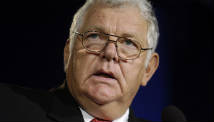Last Updated 1:13 p.m. ET
PARIS The French president says the country will raise its domestic terror threat level after military action in Mali and Somalia, promising to increase protection at public buildings and transportation networks.
President Francois Hollande said Saturday he had ordered increased security after the French military operations in the two African countries against Islamist forces.
France has some of the world's most recognizable monuments and a wide-ranging national transportation network; like the U.S., it also has an organized government response if there are specific fears of a terrorist attack.
French airstrikes overnight in Mali drove back Islamic rebels from a key city and destroyed a militant command center, the French defense minister said Saturday.
The al Qaeda-linked militants, who have carved out their own territory in the lawless desert region of northern Mali over the past nine months, recently pressed closer to a major base of the Malian army, dramatically raising the stakes in the battle for the vast West African nation.
"The threat is a terrorist state at the doorstep of France and Europe," said French Defense Minister Jean-Yves Le Drian.
The French operation, which started Friday in the former French colony, came after an appeal for help from Mali's president.
A French special forces helicopter pilot was killed in the fighting, which involved hundreds of French troops and overnight airstrikes on three rebel targets, said Le Drian. He said a rebel command center outside the key city of Konna was destroyed.
A military official in Mali said Islamist militants were driven out of Konna, but that the city captured by the extremists earlier this week was not yet under government control.
"We are doing sweeps of the city to find any hidden Islamist extremist elements," said Lt. Col. Diarran Kone. "The full recovery of the city is too early to determine as we do not yet control the city, and we remain vigilant."
Sanda Abu Mohammed, spokesman for Islamist group Ansar Dine, told The Associated Press he could not confirm if his fighters were still in Konna. "I cannot tell you if our fighters are still in the city of Konna or if they are not, because since yesterday afternoon I have not had contact with them as the telephone network has been down in this zone," Mohammed said Saturday.
Al Qaeda's affiliate in Africa has been a shadowy presence for years in the forests and deserts of Mali, a country hobbled by poverty and a relentless cycle of hunger. Most Malians adhere to a moderate form of Islam.
In recent months, however, the terrorist group and its allies have taken advantage of political instability, taking territory they are using to stock weapons and train forces.
Turbaned fighters control major towns in the north, carrying out amputations in public squares just as the Taliban did. And as in Afghanistan, they are flogging women for not covering up. Since taking control of Timbuktu, they have destroyed seven of the 16 mausoleums listed as world heritage sites.
President Hollande said the "terrorist groups, drug traffickers and extremists" in northern Mali "show a brutality that threatens us all." He vowed that the operation would last "as long as necessary."
1/2
















